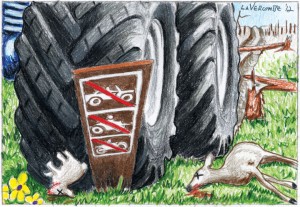By Ed Quillen
Although I was born in 1950 and was thus around for the 1952 and 1956 presidential elections, I don’t remember them at all. Such recollections start with 1960, John F. Kennedy vs. Richard M. Nixon. My fifth-grade teacher, Mrs. Wentworth, had us follow the campaign. We had to bring in a campaign clipping every week for current events, and we were supposed to catch the debates – which I did on radio, because our family didn’t have a TV at the time.
That said, I don’t remember much of it. My parents and Mrs. Wentworth and just about every other adult I encountered were all for Nixon, and that there was some concern about Kennedy’s being a Roman Catholic. As best I can remember, the argument was that as a Catholic, JFK was obliged to obey the Pope, who was not only the head of a church but also the head of a sovereign nation, the Vatican City. And the President of the United States should not be obliged to obey a foreign ruler.
Logical enough, I suppose, although Jacqueline Kennedy is reported to have said, “All those people concerned about Jack’s Catholicism. If they’d only known what a bad Catholic he was.”
This is a difficult topic because no matter what you write, somebody is going to jump on you. Earlier this year I tried to address a religious-freedom issue in a Denver Post column, and got several e-mails advising me about what the Pope had to say on the topic.
In reply, I pointed out that one Elijah Quillen had emigrated from Ireland to Virginia in 1755 just so he wouldn’t have to pay any attention to the Pope, and that 257 years later, I find this to be one of the blessings of being an American: I don’t have to pay attention to any Pope, bishop, priest, parson, theologian, guru, swami, prophet or shaman. I wasn’t about to be bound by what Thomas Jefferson called the chains of “monkish ignorance and superstition.”
If I understand a recent controversy correctly, we had a federal regulation which said that if an employer was to provide health insurance, then that insurance had to cover contraception. The Roman Catholic Church is morally opposed to contraception, and the church is an employer that provides health benefits. So this was framed as an assault on religious freedom, forcing an organization to pay for something it found immoral.
Whatever Republican Obama-hater came up with that method of framing this issue was pretty smart, I’ll give him that. But there’s a line that hasn’t been crossed. Consider war time with a military draft. We allow for conscientious objection to military service; that is, people who have moral scruples about using deadly force toward national ends are excused from service on that account. But they still have to pay taxes to support the military, and that requirement is not considered an assault on religious freedom.
So if the federal government were proposing to force Catholic women to take birth-control pills, that would be an infringement on religious liberty and I’d be denouncing the scheme. But forcing people to pay for things they find immoral – well, that’s what governments do, and it’s not an assault on religious liberty if tax money from a Jehovah’s Witness somehow ends up helping support a blood bank.
Further, this Republican solicitude for the teachings of the Church of Rome is rather selective. Whatever the Church has to say about birth control should determine federal policy, in the GOP mindset.
But on other matters, not so much. There’s this from a letter of Aug. 31, 2011, from the U.S. Conference of Catholic Bishops addressed to the Joint Select Committee on Deficit Reduction of the U.S. Congress:
“1. Every budget decision should be assessed by whether it protects or threatens human life and dignity.
“2. The central moral measure of any budget proposal is how it affects ‘the least of these’ (Matthew 25). The needs of those who are hungry and homeless, without work or in poverty should come first.
“3. Government and other institutions have a shared responsibility to promote the common good of all, especially ordinary workers and families who struggle to live in dignity in difficult economic times.”
Now, tell me how the Bishops’ letter fits with extending the Bush tax cuts, subsidizing oil companies, building more bombs, or other expressed GOP priorities. Or, the next time you hear a Republican whining about job-killing clean-air regulations, you might consider the words of the Bishop of Stockton, Calif., Stephen Blaire:
“It is our concern as people of faith to care for the air entrusted to us as a gift which belongs to the human family. And as people of faith, we bring a moral voice to often-contentious debates about environmental concerns such as air pollution. Those debates frequently focus solely on costs and benefits. People of faith bring a unique and important message: about the care of God’s gift of creation, about those most vulnerable to environmental injustice – on the margins of our societies and those with fewest resources to protect themselves or advocate on their own behalf. We urge policy-makers to move beyond the cost/benefit analysis and consider the common good.”
This hardly sounds like a section from Atlas Shrugged, does it? Back in 1986, the U.S. Catholic Bishops issued a pastoral letter called “Equal Justice for All.” It doesn’t sound much like Ayn Rand or a Republican platform plank. Consider this:
“The concentration of privilege that exists today results far more from institutional relationships that distribute power and wealth inequitably than from differences in talent or lack of desire to work. These institutional patterns must be examined and revised if we are to meet the demands of basic justice. For example, a system of taxation based on assessment according to ability to pay is a prime necessity for the fulfillment of these social obligations.”
Or this:
“[I]t is the responsibility of all citizens, acting through their government, to assist and empower the poor, the disadvantaged, the handicapped, and the unemployed. Government should assume a positive role in generating employment and establishing fair labor practices, in guaranteeing the provision and maintenance of the economy’s infrastructure, such as roads, bridges, harbors, public means of communication, and transport. It should regulate trade and commerce in the interest of fairness. Government may levy the taxes necessary to meet these responsibilities, and citizens have a moral obligation to pay those taxes. The way society responds to the needs of the poor through its public policies is the litmus test of its justice or injustice. The political debate about these policies is the indispensable forum for dealing with the conflicts and trade-offs that will always be present in the pursuit of a more just economy.”
With a little more digging, I could doubtless find plenty more bleeding-heart socialism from the Catholic church. And perhaps it should be noted that our economic system would collapse if we still followed the medieval church’s teachings about usury, which was then defined as charging any rate of interest whatsoever, and denounced by St. Thomas Aquinas as an effort to sell time, which could not ethically be bought or sold. In other words, it was sinful to lend money at interest.
Eventually, usury came to mean an exorbitant rate of interest, like those notorious 20-percent-a-week “payday loans.” Which, of course, the Republicans in our legislature defended.
Now, economic historians have argued that the Church’s ban on interest stifled the economy of Europe well into the 15th century, and there were all those saint’s days and feasts that kept a lot of work from getting done sooner, also not good for the economy. There’s a reason we have something called “the Protestant Ethic,” after all.
It isn’t my intention here to ignite a religious war. But I do think those who say our system should reflect their church’s beliefs shouldn’t be so selective about which beliefs are important. If the availability of contraception is a violation of religious freedom and an affront to morality, then so is polluted air and hungry children. Don’t try to present your church as an authority on one earthly matter unless you’re prepared to accept your church as an authority on all matters temporal.
Otherwise, a lot of us unchurched types will just see you as hypocrites looking to reinstate old ways of oppressing our fellow citizens.
Ed Quillen is a lapsed Baptist who lives across the street from two churches in Salida.





